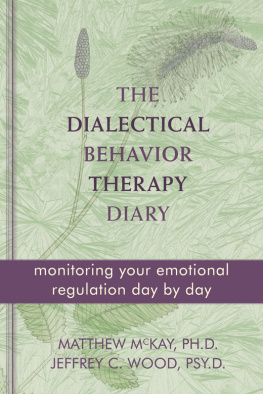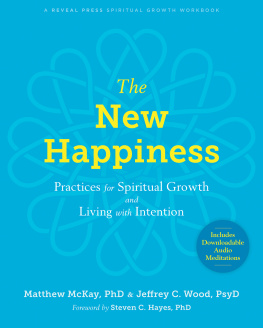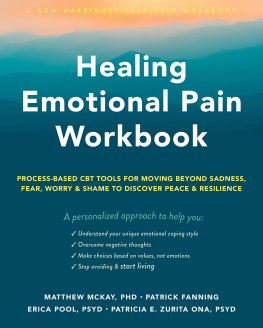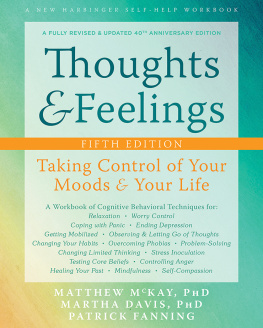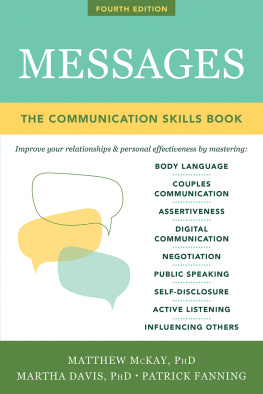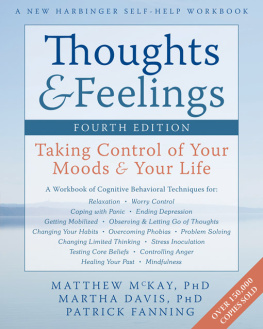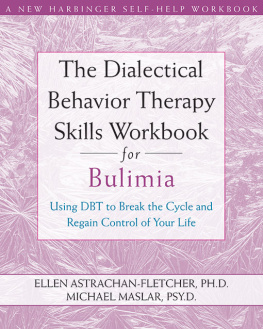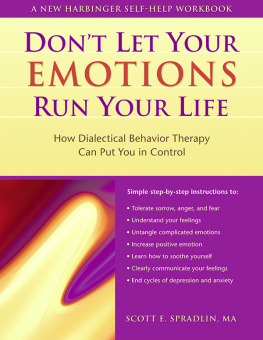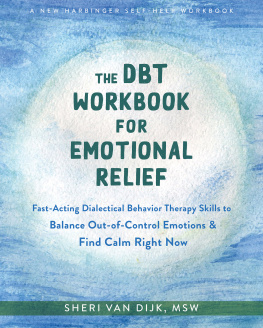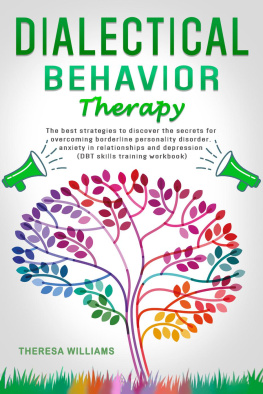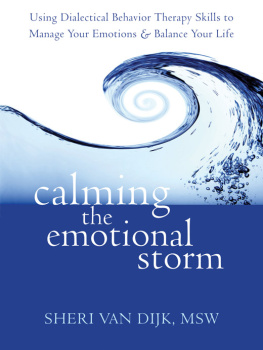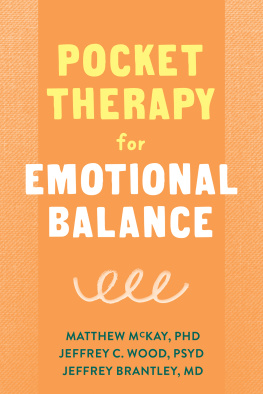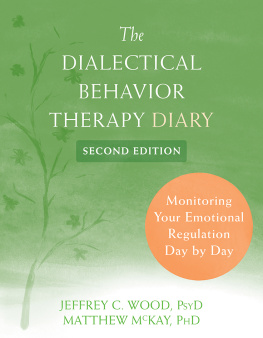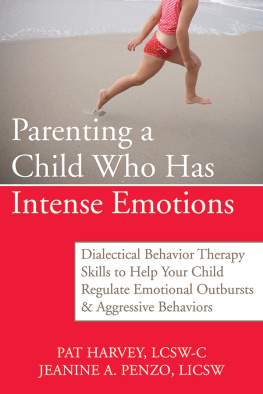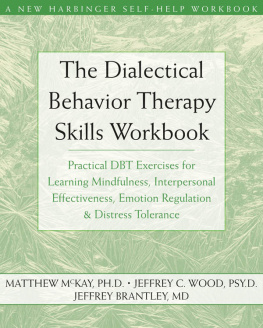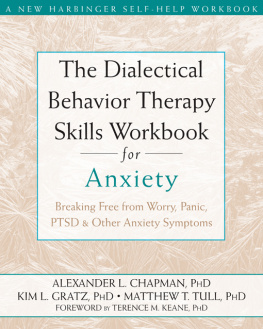A Note to eBook Readers
The print edition of this work come with a bound-in CD-ROM that contains PDF versions of many of the worksheets, forms, and assessments found herein. All of these files are available to you for download at http://nhpubs.com/9561.
Please note that the purchase of this ebook does not include a physical copy of the CD-ROM.

Publishers Note
This publication is designed to provide accurate and authoritative information in regard to the subject matter covered. It is sold with the understanding that the publisher is not engaged in rendering psychological, financial, legal, or other professional services. If expert assistance or counseling is needed, the services of a competent professional should be sought.
Distributed in Canada by Raincoast Books
Copyright 2011 by Matthew McKay and Jeffrey C. Wood
New Harbinger Publications, Inc.
5674 Shattuck Avenue
Oakland, CA 94609
www.newharbinger.com
Cover design by Amy Shoup
Text design by Michele Waters-Kermes
Acquired by Catharine Sutker
Edited by Jasmine Star
All Rights Reserved
epub ISBN: 9781608822744
The Library of Congress cataloged the print edition as:
McKay, Matthew.
The dialectical behavior therapy diary : monitoring your emotional regulation day by day / Matthew McKay and Jeffrey C. Wood.
p. cm.
Includes bibliographical references.
ISBN 978-1-57224-956-1 (pbk.) -- ISBN 978-1-57224-957-8 (pdf ebook) 1. Dialectical behavior therapy. I. Wood, Jeffrey C. II. Title.
RC489.B4M425 2011
616.89142--dc22
2010046097
Contents
Introduction: Dialectical Behavior Therapy
What Is DBT?
Dialectical behavior therapy (DBT) was originally created by Dr. Marsha Linehan (1993a) to help people who were struggling with borderline personality disorder. It was designed to teach people practical skills to improve their lives, and research showed that it was very successful. Now DBT is also being used to help people who are struggling with a wide variety of other problems, including depression, bipolar disorder, and anxiety. The common factor in all of these problems is overwhelming emotions.
Overwhelming Emotions
People who struggle with overwhelming emotions often feel vulnerable. At any point, the smallest trigger can lead to a tidal wave of emotions that leaves them feeling confused, angry, alone, hopeless, and in pain. Because of this, people who struggle with overwhelming emotions often try desperately to maintain control of their feelings, their relationships, the actions of others, and their environments. But no matter how hard they try, something always seems to go wrong and once again they get overwhelmed by their feelings. Some people with this problem have been struggling with it since childhood. Others are also dealing with the devastating impact of early physical, emotional, or sexual abuse. In addition, many of them struggle with problems like dysfunctional relationships, interference with their schoolwork or job, health problems, dangerous or self-harming behaviors, and an inability to focus or concentrate. The combined result of all these issues can be truly painful, both emotionally and physically.
The Four DBT Skills Groups
Luckily, DBT has successfully taught thousands of people how to cope with issues related to overwhelming emotions. In general, DBT teaches four groups of practical skills that will help you in many areas of your life:
- Distress tolerance skills will help you distract from painful situations when you cant cope with them, and then relax and soothe yourself.
- Mindfulness skills will help you stay focused on whats happening in the present moment, concentrate, and make healthier choices as a result.
- Emotion regulation skills will help you identify and name your feelings, and then learn how to tolerate them without getting overwhelmed.
- Interpersonal effectiveness skills will give you the tools to improve your relationships, ask for what you want in an effective way, say no, and establish appropriate boundaries, in a respectful, healthy way.
The Purpose of This Book
This book, The Dialectical Behavior Therapy Diary, will teach you many of the skills from the four groups. It was written as a companion to The Dialectical Behavior Therapy Skills Workbook (McKay, Wood, and Brantley 2007), where you will find in-depth explanations of each of the four skills groups, as well as additional exercises in each category.
This diary is designed to enhance the progress that youve already made in individual DBT treatment, in DBT group treatment, or on your own using The Dialectical Behavior Therapy Skills Workbook. (If you arent already familiar with DBT skills, you might want to consult The Dialectical Behavior Therapy Skills Workbook or a DBT therapist for assistance.)
In general, this DBT diary has three purposes:
- To remind you of the core DBT skills in each of the four groups
- To record your successes each time you use one of the skills
- To help you observe and record the overall improvements in your life due to using these skills on a daily basis
Many people in DBT treatment mistakenly think that theyre using the skills more often than they really are, or they dont remember the small successes they have using their skills. Either way, they dont make improvements as quickly as they could. The goal of this book is to help you become more active in your treatment and find out for yourself what kind of impact the skills are having on your daily life.
How to Use the Diary
After the four chapters of this book, which review the core skills in each of the four groups, youll find enough blank diary pages for fifty-two weeksan entire year of recording your progress using DBT. In order to optimize your use of this diary, youll need to do three things:
- Learn the skills and practice them as often as possible.
- Be sure to record the number of times you use each skill every day. For the fastest improvements, record each skill as soon as you use it. But at the very least, record your skills at set times throughout the day, maybe at lunch and dinner, or at the end of each day before you go to sleep. Dont wait until the next day or the end of the week since you might forget.
- And most importantly, note in the diary how you feel at the end of each day. Its very important to see if theres a connection between using the coping skills and improving your mood. This is the evidence youll need to determine if the treatment is working. Hopefully youll notice, over time, that the more coping skills you use every day, the better you feel.

